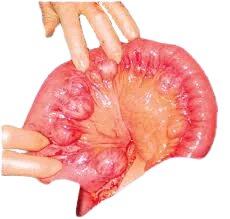Small intestine cancer
Indications
 Small intestine cancer is a rare type of cancer that occurs in the small intestine. Your small intestine, also called the small intestine, is a long tube that carries digested food between your stomach and your large intestine (colon).
Small intestine cancer is a rare type of cancer that occurs in the small intestine. Your small intestine, also called the small intestine, is a long tube that carries digested food between your stomach and your large intestine (colon).
The small intestine is responsible for digesting and absorbing nutrients from the food you eat. It produces hormones that help digestion. The small intestine also plays a role in your body's germ-fighting immune system because it contains cells that fight off bacteria and viruses that enter your body through your mouth.
Types of small intestine cancer include:
Adenocarcinoma.
Neuroendocrine tumors including carcinoid tumors and paraganglioma.
Lymphoma.
Sarcoma, including gastrointestinal stromal tumor.
Symptoms
Signs and symptoms of small intestine cancer include:
Abdominal pain.
Yellowness of the skin and the whites of the eyes (jaundice).
Feeling unusually weak or tired.
Nausea.
Vomiting.
Lose weight without trying.
Blood in the stool, which may appear red or black.
Watery diarrhea.
Redness of the skin.
Causes
Doctors aren't sure what causes most small bowel cancers.
In general, cancer of the small intestine begins when healthy cells in the small intestine develop changes (mutations) in their DNA. A cell's DNA contains a set of instructions that tell a cell what to do.
Healthy cells grow and divide in an orderly way to keep your body functioning normally. But when a cell's DNA is damaged and becomes cancerous, the cells continue to divide, even when new cells are not needed. As these cells accumulate, they form a tumor.
Over time, cancer cells can grow to invade and destroy nearby normal tissue. And cancer cells can spread (metastasize) to other parts of the body.
Risk factors
Factors that may increase the risk of small intestine cancer include:
Gene mutations have run through families. Certain genetic mutations inherited from your parents can increase your risk of small intestine cancer and other cancers. Examples include Lynch syndrome, familial adenomatous polyposis (FAP), and Peutz-Jeghers syndrome.
Other intestinal diseases. Other diseases and conditions that affect the intestines can increase the risk of small intestine cancer, including Crohn's disease, inflammatory bowel disease, and celiac disease.
Weakened immune system. If your body's anti-germ immune system is weakened, you may have an increased risk of small intestine cancer. Examples include people with HIV infection and those taking anti-rejection drugs after an organ transplant.
Complications
Small intestine cancer can lead to complications, including:
An increased risk of other cancers. People with cancer of the small intestine have a higher risk of having other types of cancers, including those that affect the colon, rectum, ovaries, and lining of the womb (endometrium) .
Cancer that spreads to other parts of the body. Advanced small intestine cancer can spread (metastasize) to other parts of the body, most often to the liver.
Diagnosis
Exams to detect cancer of the small intestine are abdominal ultrasound and CT scan with opacification of the digestive tract. It is also necessary to combine it with a morphological exploration of the liver, looking for metastases.
Processes
The treatment is essentially surgical. The surgical act will make it possible to precisely explore the whole of the abdominal cavity, to ensure the intestinal resection, that is to say the excision of the piece of intestine invaded by the tumor, the two ends then being sutured one to another in order to restore the continuity of the intestine.